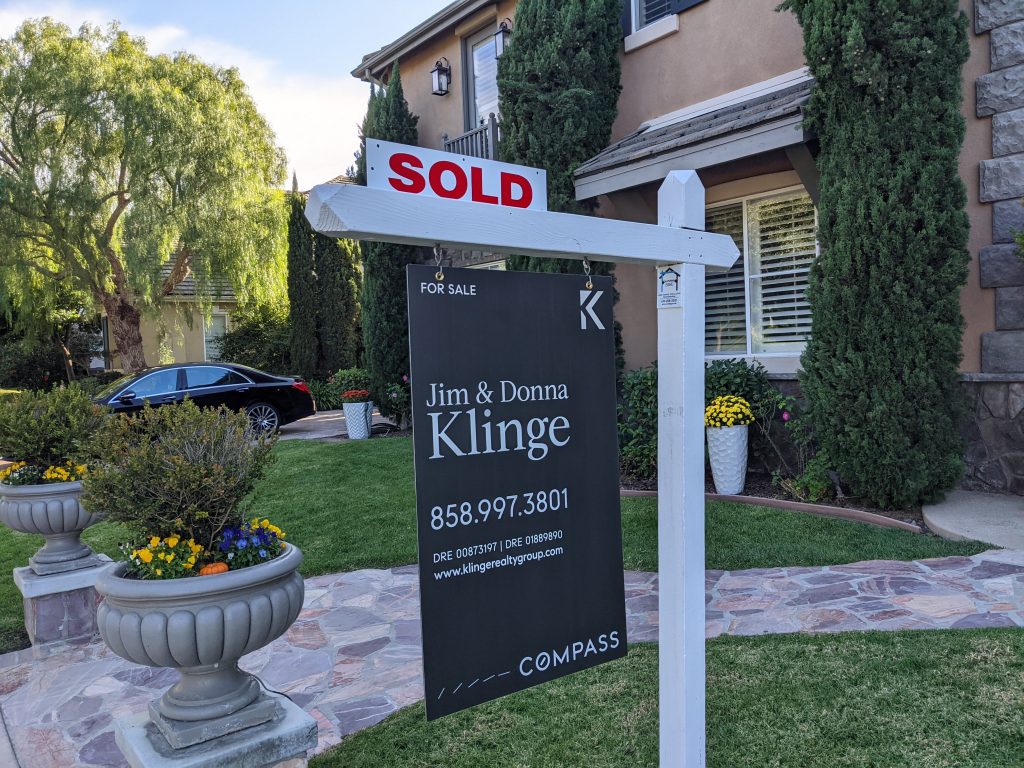Bidding War!


Why you should Get Good Help!
Kim Rohrer was looking forward to leaving the leaky windows in the two-bedroom Berkeley rental duplex that she shared with her husband and two small children.
The couple recently found a three-bedroom, two-bathroom chalet-style house in Berkeley listed for $799,000, which seemed relatively affordable for the area.
The house needed significant work, including plumbing upgrades, but the couple wasn’t deterred. “It was like a dream house,” said Ms. Rohrer, who works in human resources for a tech company. (Her husband works at the University of California, Berkeley.)
The couple offered well above the asking price: $850,000. They knew there would likely be multiple offers but they also needed to save some money for the necessary repairs. They didn’t get the house.
They didn’t even come close. The home sold for $1.4 million — nearly double its asking price. “It’s terrible,” she says of her house hunting experience so far. “Completely terrible.”

This is a repeat of the 2br house featured on my tour a few weeks ago, with the resulting sales price.
The agent admitted they priced this 2br house low on purpose to attract a crowd, and it worked. The list price was $699,000, and it sold for $1,100,000 cash. Meanwhile, the two other listings around the corner priced at $1,149,000 and $1,200,000 are still unsold.
Sellers are resistant to price attractively, but look how well it works when you Get Good Help!
Sold for 57% above list!
https://www.compass.com/listing/2725-glasgow-drive-carlsbad-ca-92010/842339809239950025/
With no single-family homes in Carlsbad priced under $1,000,000, what do you get at the entry level? Here you go – a 1,350sf condo priced at $615,000 that has drawn several offers, and the bidding war is on:
The percentage of buyers who were willing to pay over list reached another all-time high in July:
NSDCC Detached-Home Sales, % Closed Over List Price
January: 38%
February: 43%
March: 53%
April: 55%
May: 54%
June: 59%
July: 64%
There were 33% of the total sales that closed for $100,000+ over list price!
One out of three!
In July, it was the $1,500,000-$2,000,000 range that was red hot, with an incredible 82% paying over list:
Percentage Who Paid Over List Price by Price Range
| Price Range | |||||
| $0 – $1.0M | |||||
| $1.0M – $1.5M | |||||
| $1.5M – $2.0M | |||||
| $2.0M – $3.0M | |||||
| $3M+ |
The average and median prices were slightly lower MoM, but the product mix is different every month. Just having the average and median sales prices being higher than the list prices is remarkable enough:
NSDCC Average and Median Prices
| Month | |||||
| Feb | |||||
| March | |||||
| April | |||||
| May | |||||
| June | |||||
| July | |||||
| July, 2020 |
Compared to last July, the average sales price was +31%, and the median sales price was +30%!
~~~~~~~~~~~~~~~~~~~~~~~~~~~~~~~~~~~~~~
If you enjoy reading stories on the real estate insanity around the state and elsewhere, here’s a solid collection of 100+ over-list examples and buyer despair:
https://twitter.com/sallykuchar/status/1396863249409183752
~~~~~~~~~~~~~~~~~~~~~~~~~~~~~~~~~~~~~~~~~~
Here’s a great snapshot of how the vast majority of listing agents handle multiple offers. They just grab one, and kiss off the rest – which isn’t good for the sellers, it’s not good for the losing buyers who might have made a better offer if there was a highest-and-best round, and it’s not good for the buyer-agents who should have the right to compete fairly to sell the home.
But the listing agent gets to go back to sleep, so there’s that.
The most common response? “I just did what the seller wanted to do”. But isn’t it your job to advise them of a way to create a fair competition that could get them a better offer and more money? I think so.
Two years ago, the National Association of Realtors began the Clear Cooperation Policy, a directive that compels agents to submit their listings to the MLS within one business day after any public marketing.
It was an attempt to quell off-market sales, but Glenn says that it’s done the opposite.
Specifically, because the CCP allows brokerages to have ‘Office Exclusives’, he asserts that more companies are withholding their listings from the MLS and selling them in-house without any attempt to include outside agents or buyers.
Rob and Sam, two industry titans, conducted a livestream discussion to see what else can be done.
Rob has the likely solution – that any agent who wants to exclude their listing from the MLS will need to get a signed waiver from the MLS committee to do so.
Yes, it has come to that – agents can’t be trusted to play by the rules, and will need a permission slip from the principal to officially withhold a listing from the MLS.
But it gets worse – I left a bomb in the comment section here:
https://notorious-rob.com/2021/05/in-which-sam-debord-and-i-solve-the-clear-cooperation-dilemma/
The frustration among buyers on how listing agents handle their multiple offers is continuing to mount. Because there isn’t any guidance from the industry, listing agents just make it up as they go – and in most cases, they just pick their favorite without any thought of other solutions available.
Here are more ways I’ve seen sellers leave money on the table lately:
Listing agents selling homes during their Coming Soon period, denying any other buyers.
Counter buyers for their highest-and-best, but then accept one within minutes before other responses are received.
Only countering some of the offers.
Off-market deals, which are great for the winning buyer, but bad for seller and other buyers.
The worst part is that sellers don’t have a clue – they are just happy to sell for more than expected.
When I’ve suggested my method to agents, they have trouble grasping the concept – that’s how deep the current snatch-and-grab mentality is ingrained in agents to make a quick deal.
What’s the solution? List your home with me!
It never occurs to agents to properly conduct a bidding war where the market decides the winner.
Instead, they choose the easy route and just collect offers, itemize them on a spreadsheet, and then point out a winner to the sellers. It is an ego-boosting choice that fares well around the brokerage’s water cooler, but is likely to leave loads of money on the table.
Agents who deny open bidding and just process one round of blind offers are clerks, not salesmen.
https://www.nytimes.com/2021/04/23/realestate/home-selling.html
By the time they got the last offer, Quinn and Daryn Shapurji had received 54 bids on their four-bedroom, single-family house in Fishers, Ind., in just three days. Ms. Shapurji said they felt totally overwhelmed — and a bit melancholy.
“We felt bad that we had to say no to so many people, because we got a lot of beautiful letters from buyers saying how much they loved our house and why they wanted to live in the area,” said Ms. Shapurji, 32, a closing coordinator for a home builder. “Some buyers had already struck out on five or six homes.”
Chris Dossman, the couple’s real estate agent, suggested they take a cash offer that was $25,000 above their home’s list price of $220,000. “It wasn’t the highest offer they received, but the cash buyer waived the appraisal, so we knew that we weren’t going to have an issue with the home closing from a financing perspective,” said Ms. Dossman, an agent with Century 21 Scheetz based in Indianapolis.
“Fifty-four offers is by far the highest number of offers that I’ve ever received for a listing,” added Ms. Dossman, who has been an agent for 15 years.
“We’re seeing an inventory crisis,” said Katie Wethman, a Washington, D.C.-based real estate agent at Keller Williams Realty. Indeed, total home supply at the end of March sat at only 1.07 million units, down 28.2 percent from a year ago, according to the National Association of Realtors. The association’s data also found that homes typically sold in a record-low time of just 18 days in March, down from a 29-day average in March 2020.
Still, sellers face a challenge: “Getting inundated with offers can be overwhelming, and it can make it harder for sellers to choose the best offer,” said Alicia Stoughton, a real estate agent and designer at Keller Williams Advisors in Cincinnati, Ohio.
Why? Because “the highest offer isn’t always the best offer,” Ms. Stoughton said.
Here are the factors sellers should consider, in addition to purchase price, when evaluating multiple offers.
“Cash is king,” according to Nancy Newquist-Nolan, a real estate agent at Coldwell Banker in Santa Barbara, Calif. “I often recommend sellers take a cash offer, even if it’s not the highest offer.”
Still, mortgage buyers aren’t completely out of the running, said Ms. Wethman. “If you’re confident in the buyer’s lender and their ability to get approved for a mortgage, there’s not a lot of risk taking an offer from a buyer who’s getting a loan,” she said. Her advice to sellers? “Do your due diligence on the lender who is providing the funds,” she recommends.
This is a step where sellers can lean on their listing agent, Ms. Newquist-Nolan said. “I call up the lender and ask how qualified the buyer is for their loan,” she said. Moreover, “some lenders are notorious for dragging their feet and missing key deadlines.”
The best approach that sellers can take when weighing offers, Mr. Lejeune said, is to compare them side-by-side. His strategy: “I present offers to my clients in an Excel spreadsheet that specifics the offer price, loan amount, type of loan, contingencies, and other important metrics,” he said. “It’s basically a cheat sheet for sellers.”
Ms. Dossman is also a fan of presenting offers in a spreadsheet. As she puts it, “You want to have all the information in front of you when you’re making a decision.”
Many buyers attach personal letters with their offers to try to sway the sellers in their favor. But some real estate agents don’t even show sellers these letters when they present offers to avoid the possibility of unlawful bias against a buyer. But Ms. Dossman said she will share letters after vetting them to make sure there isn’t any information that could raise the potential for fair housing violations.
Read full article here:
https://www.nytimes.com/2021/04/23/realestate/home-selling.html